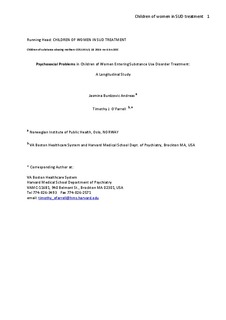Psychosocial problems in children of women entering substance use disorder treatment: A longitudinal study
Peer reviewed, Journal article
Permanent lenke
http://hdl.handle.net/11250/2426917Utgivelsesdato
2016Metadata
Vis full innførselSamlinger
- Artikler [5068]
- Publikasjoner fra CRIStin FHI [7544]
Sammendrag
While parental substance use disorder (SUD) has been recognized as a risk factor for child outcomes, past research seldom focused specifically on children whose mothers suffer from alcohol and drug use disorders. Are these children at risk for elevated psychosocial problems, and would such risk be reduced if maternal substance use was reduced? Children of substance-abusing mothers (COSAM, N = 130) were compared to a demographically matched comparison sample, and examined soon after their mothers entered SUD treatment and in the 18 months after treatment entry. We expected to observe elevated symptomatology among COSAM at baseline assessment, followed by a decreasing trend after maternal treatment in general, and remission in particular. Children's psychosocial problems were assessed through maternal reports on the Pediatric Symptom Checklist. Soon after their mothers entered SUD treatment, COSAM exhibited significantly greater overall and clinical-level psychosocial problems than the children from the matched comparison sample. However, at the end of the 18-months study period, these two groups no longer differed in terms of problems. Results from the longitudinal growth models revealed reductions in COSAM's overall and clinical-level problems following their mothers' SUD treatment. However, these reductions were similar for all COSAM, regardless of whether their mothers relapsed or remitted. Psychosocial problems were significantly reduced in COSAM following maternal SUD treatment, such that COSAM did not significantly differ from children from the matched comparison sample by the end of the 18-month study period.
